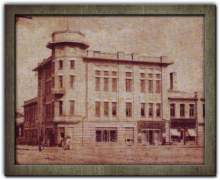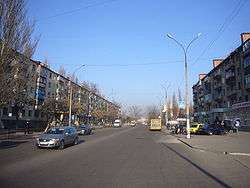Pavlohrad
| Pavlohrad | |||
|---|---|---|---|
| |||
| Country |
| ||
| Oblast | Dnipropetrovsk Oblast | ||
| Raion | Pavlohrad City Council | ||
| Established | 1779 | ||
| City rights | 1784 | ||
| Government | |||
| • Mayor | Ivan Metelytsia | ||
| Area | |||
| • Total | 59.3 km2 (22.9 sq mi) | ||
| Highest elevation | 71 m (233 ft) | ||
| Population (2014) | |||
| • Total | 109 739 | ||
| Postal code | 51400-51429 | ||
| Area code(s) | +380-5632 | ||
| Website | http://pavlograd-official.org/ | ||
Pavlohrad or Pavlograd (also known in English as 'Pavolgrad'[1]) (Ukrainian: Павлогра́д; Russian: Павлогра́д) is an industrial city in eastern Ukraine, located within the Dnipropetrovsk Oblast. Administratively, Pavlohrad is incorporated as the town of oblast significance and serves as the administrative center of Pavlohrad Raion which it does not belong to. Population: 110,070 (2013 est.)[2]. It had a population of 118,800 in 2001.
The rivers of Vovcha (runs through the city 12.85 kilometres (7.98 mi) towards the Samara River), Hnizdka (3.9 kilometres (2.4 mi)), Kocherha (2.9 kilometres (1.8 mi)) flow through Pavlohrad. The area of the city is 59.3 square kilometres (22.9 sq mi). There are 20 schools and 1 lyceum in the city.
History
Pavlohrad is one oldest settlements in Dnepropetrovsk oblast. The first references to it are from the 17th century. At the beginning 1770 zaporozhsky Cossack`s head Matvei Khizhnyak built winter quarters, from which went “Matveevskie khutora”, and later — sloboda Matveevka. From 1779 year Matveevka renamed to Luganskoe, as the latter became a headquarters apartment of the Luganskiy pikinerskiy regiment`s under M. I. Golinishchev-Kutuzov rule. With establishing of Yekaterinoslav Viceroyalty, Pavlohrad, named in honor of Paul І, became a part of this composition, as district town. In 1784 year Pavlohrad received the status of the city.
There were 426 yards and 2419 inhabitants at the end of 18th century. The citizens of Pavlograd lived in wattle and daub. The first stone building was Svyato-Vosnesensky Cathedral on Soborna ploshad (eng.: cathedral square). The first blazon of city was affirmed in July 29, 1811, the second one in September 26, 1979. The first citizens were zaporozhtsky cossacs of Samarsky and Kalmiussky Phalanxes (“Palanki”) and demobilized military. The city plan was created by Scottish architect W. Geste and was affirmed by emperor Nicholas I on July 31, 1831.

At 1871 pavlohrads merchant Shalin A.K. was elected the first head of the city The central street was named after him (ul. Shalinskaya, (eng: Shalinky street) now ul. Lenina, (eng.: Lenin street)). Merchant of ІІ Guild Permanin A.V. was elected as city governor in 1892. He was very energetic, enterprising and dear person. Under his leadership city begins to develop: a lot of churches, temples, barracks, gymnasiums, factories and plants were built.

In 1896, "Earl's Theatre" was built by the Golenishchev-Kutuzov's family foud. In the 1870s a railway was built between St. Petersburg and Simferopol, which has passed through Pavlohrad.

.jpg)
In 1930 there was an uprising against Soviet rule in Pavlohrad. There was a significant Jewish community in Pavlohrad prior to 1941, which was founding in 1780. The pre-Holocaust Jewish population was approx. at 4,000. The city was destroyed during Nazi occupation in 1941. During the Holocaust, a concentration camp was located in the city and a large part of the community died during the war and during the mass executions. The Pavlohrad Jewish cemetery contains not only Jewish, but also Christian burials, which were agreed to by the leaders of the local Jewish community in 1995.[3] On May 22, 2011, it was reported that unknown persons desecrated the cemetery in the town - tombstones were turned over and broken as what seems to be an anti-Semitic act.[4]
Pavlohrad Mechanical Plant
The city is home to Pavlohrad Mechanical Plant (PMZ) that was established in December 1963 as a specialized production facility of the Plant no. 586 (now Pivdenmash Production Association). Russian Defense Business Directory (1995) quotes 1931 as establishment date. Perhaps, that relates to a previous facility, which existed at that place and was used as a basis for PMZ. (According to some sources, it was initially a workshop associated with an artillery test range.) PMZ is a dedicated factory for assembly, perfection and production of solid-fueled rocket engines and missiles. By 1975 PMZ became the largest solid-rocket factory within the Ministry of General Machine Building of USSR. PMZ made fuel tanks for booster rockets and plastic ICBM rocket motor casings; parts, components, and assemblies for aerospace systems manufacturing.
Gallery
-

A pedestrian alley in midtown Pavlohrad
-

Holubytsky church in Pavlohrad
-

Karl Marx Street
-
Pavlograd Railway Station
-
Tank monument, Pavlograd
-

Remains of Lenin monument in Pavlohrad
International relations
Twin towns — Sister cities
Pavlohrad is twinned with:
-
 Lubsko, Poland
Lubsko, Poland -
 San Sebastián, Spain
San Sebastián, Spain
References
- ↑ "Alexeenko, Fyodor Nikitich (1882-1904)". jstor.org. Retrieved 5 September 2015.
- ↑ "Чисельність наявного населення України (Actual population of Ukraine)" (in Ukrainian). State Statistics Service of Ukraine. Retrieved 21 January 2015.
- ↑ "PAVLOHRAD JEWISH CEMETERY". lo-tishkach. Retrieved 30 September 2012.
- ↑ "Cemetery desecrated". CFCA. Retrieved 30 September 2012.
External links
- The murder of the Jews of Pavlohrad during World War II, at Yad Vashem website.
| Wikimedia Commons has media related to Pavlohrad. |
| ||||||||||||||||||||||||||||
Coordinates: 48°31′0″N 35°52′0″E / 48.51667°N 35.86667°E

